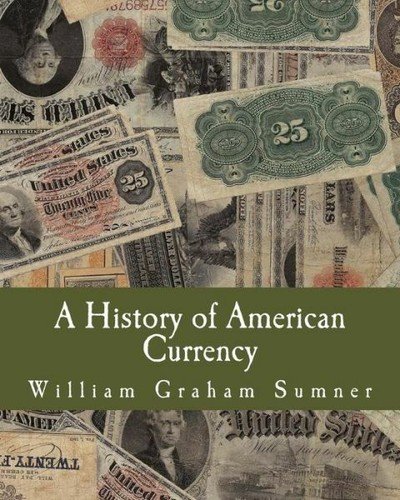
Item specifics
-
Condition
-
-
ISBN
-
9781493551309
-
Book Title
-
History of American Currency
-
Publisher
-
CreateSpace
-
Item Length
-
10 in
-
Publication Year
-
2013
-
Format
-
Trade Paperback
-
Language
-
English
-
Item Height
-
0.9 in
-
Features
-
Large Type
-
Genre
-
Business & Economics
-
Topic
-
Money & Monetary Policy
-
Item Weight
-
34.5 Oz
-
Item Width
-
8 in
-
Number of Pages
-
398 Pages
A History Of American Currency (Large Print Edition)
About this product
Product Identifiers
Publisher
CreateSpace
ISBN-10
1493551302
ISBN-13
9781493551309
eBay Product ID (ePID)
175204309
Product Key Features
Book Title
History of American Currency
Number of Pages
398 Pages
Language
English
Publication Year
2013
Topic
Money & Monetary Policy
Features
Large Type
Genre
Business & Economics
Format
Trade Paperback
Dimensions
Item Height
0.9 in
Item Weight
34.5 Oz
Item Length
10 in
Item Width
8 in
Additional Product Features
Intended Audience
Trade
TitleLeading
A
Edition Description
Large Type / large print edition
Synopsis
LARGE PRINT EDITION More at LargePrintLiberty.com.The author, William Graham Sumner, was the great sociologist of late 19th century America, but also a wise observer of economic conditions.In 1874, in the midst of another debate about the future of the American monetary system, he offered this sweeping history of the calamity of paper money in the United States from the Colonial Period to the Civil War. In many ways, it is a popular history in the sense that he hoped it could be read by anyone.What’s strike here is his “Austrian” understanding of the relationship of paper money to credit cycles, inflation, and corruption. He was a firm advocate of sound money and 100% reserve banking.His lesson was that paper currency leads to a trap: continued crisis, hyperinflation, or the restoration of sound money. This pattern has been repeated again and again. The burden of this book is to show that there is nothing good to come out of any paper money experiment, and that sound money is the only answer in a free society.So there is profound historical interest in these pages–he was writing at a time when these issues were debated in all campaigns and classrooms–but also excellent theorizing too. Indeed, this work demonstrates that Sumner was not only a pioneering American sociologist but also one of the great American pre-Austrians of the late 19th century., LARGE PRINT EDITION! More at LargePrintLiberty.com.The author, William Graham Sumner, was the great sociologist of late 19th century America, but also a wise observer of economic conditions.In 1874, in the midst of another debate about the future of the American monetary system, he offered this sweeping history of the calamity of paper money in the United States from the Colonial Period to the Civil War. In many ways, it is a popular history in the sense that he hoped it could be read by anyone.What’s strike here is his “Austrian” understanding of the relationship of paper money to credit cycles, inflation, and corruption. He was a firm advocate of sound money and 100% reserve banking.His lesson was that paper currency leads to a trap: continued crisis, hyperinflation, or the restoration of sound money. This pattern has been repeated again and again. The burden of this book is to show that there is nothing good to come out of any paper money experiment, and that sound money is the only answer in a free society.So there is profound historical interest in these pages–he was writing at a time when these issues were debated in all campaigns and classrooms–but also excellent theorizing too. Indeed, this work demonstrates that Sumner was not only a pioneering American sociologist but also one of the great American pre-Austrians of the late 19th century., LARGE PRINT EDITION More at LargePrintLiberty.com. The author, William Graham Sumner, was the great sociologist of late 19th century America, but also a wise observer of economic conditions. In 1874, in the midst of another debate about the future of the American monetary system, he offered this sweeping history of the calamity of paper money in the United States from the Colonial Period to the Civil War. In many ways, it is a popular history in the sense that he hoped it could be read by anyone. What’s strike here is his “Austrian” understanding of the relationship of paper money to credit cycles, inflation, and corruption. He was a firm advocate of sound money and 100% reserve banking. His lesson was that paper currency leads to a trap: continued crisis, hyperinflation, or the restoration of sound money. This pattern has been repeated again and again. The burden of this book is to show that there is nothing good to come out of any paper money experiment, and that sound money is the only answer in a free society. So there is profound historical interest in these pages–he was writing at a time when these issues were debated in all campaigns and classrooms–but also excellent theorizing too. Indeed, this work demonstrates that Sumner was not only a pioneering American sociologist but also one of the great American pre-Austrians of the late 19th century.
Price : 17.69
Ends on : N/A
View on eBay



